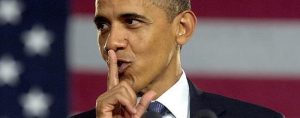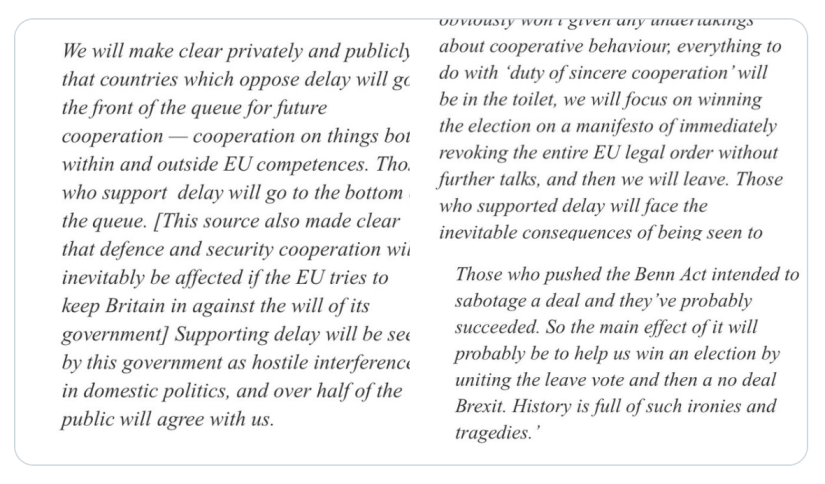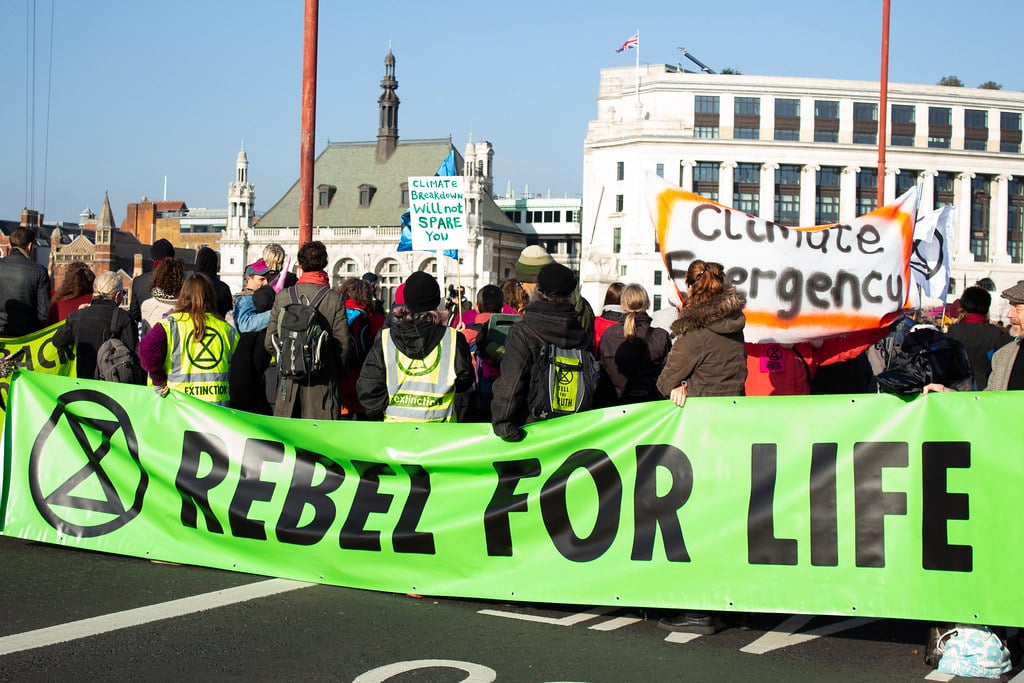Once again, the American voter has dutifully begun their quadrennial march to futility at the hands of another election cycle full of false prophets. None seem to realize or remember that the monocracy that they hold so sacrosanct is not- and has not been- a democracy for decades. Yet these societal lemmings, known as “voters,”again prepare to exert their media controlled, fact adjusted opinions at the polls while singing joyfully the praises of their one chosen new demagogue and praying that this timetheir candidate will, post-election, actually represent them from the Oval Office of American despair.
For far too long voters, political pundits and presidential opponents during each presidential election cycle have never asked that single most important campaign question: The one question that distills the essence of America’s fundamental and terminal societal and political problem. This question is never asked because the answer would immediately reveal, for all of America’s disenfranchised voters to understand clearly, who are the true masters of all potential candidates: Those grinning so menacingly at us throughout the many so-called DNC debates. Their master is not, has not, nor for more than fifty years never been the American voter.
Yes. One simple all-important question.
The cumulative results of the correct answer to this question are shown across America today. After repeated four year cycles of a full set of only the wrong questions, the voter in 2020 is once again faced with a Hobson’s choice within a pack of arguably the worst qualified presidential candidates – ethically, socially and politically – in US history.
And…then there’s Trump.
One question would indeed reveal the uselessness of each debate’s political charade of portended democracy, so… this question is never asked and the voter will again swim upstream in a renewed delusional quest for Hope and Change… once again.
*
To understand the importance of this one vital never asked question, political memory is first required. Considering the many past POTUS elections and the ultimately poor results by the people’s choice when reviewed some four years hence, these current populist media offerings on stage across the country must be compared to that of previous presidents of a bygone time: Those presidents who actually had the one, the vital, the all-important tool that should be- and is no longer– a requirement for any American president.
For nearly fifty years now, all American presidents have been miserable failures in bringing their electoral promises to bare with regards to the voter’s interest instead of their donors’. One basic reason is that all these modern-day presidents did not have, nor take the time to accumulate, the presidential tool of power necessary to bring a populist president’s will to bare. This vital presidential tool is what former Nixon General Council, Charles “Chuck” Colson, very accurately described when featuring this true meaning of real political power on his office wall:
“If you get them by the balls…their hearts and minds will follow.”
What Colson was implicitly defining is that which no American president has had available to the American voter since before the Carter administration brought its four years of tepid, useless and failed sweater politics to the White House. This pure crystalline nut of political power past is best summed up in two similarly all-powerful – and long-forgotten– words: Political Capital.
No post-Nixon president ever again had within his political quiver real Political Capital to offer the American voter. The power that gets things done… regardless of the corrupt corporate whims of the US congress.
Political Capital. A POTUS without out Political Capital has absolutely nothing to offer the American voter.
Nothing! Except for a bright white smile.
The Populist Power of Political Capital…Long, Long Ago.

Lyndon Baines Johnson, 36th US President, got what he wanted. Or else.
LBJ was a progressive to his core and made not one god damn apology for it. He was going to change America for the better. He said so. And he did. As he noted to White House staffer, Bill Moyers during his first days in the White House,
“You know, when I went into that office tonight and they came in and started briefing me on what I have to do, do you realize that every issue that is on my desk tonight was on my desk when I came to Congress in 1937?”
The real problem, to Johnson, was obvious. So, while standing in front of that exact same American problem, Johnson, in his first State of the Union address to US Congress in 1964, declared his “unconditional war on poverty.” Words? Yes. But Johnson had the Political Capital to win that war.
Before politics, Johnson had already cut his teeth on the realization of the endemic poverty and social and racial inequality in rural Texas, a societal poverty that far transcended the south and the mid-west of middle America. Johnson had personally seen, and thus abhorred, the true condition of America, one documented in 1962 by author and social activist Michael Harrington in his book, “The Other America.” His book documented that upwards of a quarter of the US population—lived in a “system designed to be impervious to hope.” That “Other America” was:
“…populated by the failures, by those driven from the land and bewildered by the city, by old people suddenly confronted with the torments of loneliness and poverty, and by minorities facing a wall of prejudice. Trapped in a national ghetto, a modern poor farm for the rejects of society and of the economy.”
These words, after fifty years of failed presidents, still ring all too true again today. Why?
America’s condition then disgusted Johnson. To this battle, he informed congress collectively, “The richest nation on Earth can afford to win it. We cannot afford to lose it.” Johnson detested the hypocrisy of those congressional politicians who allowed the status quo of inequality to continue. Johnson would, after three decades, grab congress.. by the balls!
And then Johnson would squeeze. Hard!
Johnson was a student, prodigy and product of real DNC power of long ago. Not talk. Power. As LBJ biographer Robert A. Caro, documented in Master of the Senate,
“…he worked himself, worked himself. He had made up his mind to be President, and he was demonic in his drive.”
Johnson, like many political aspirants today, also started from humble roots in the heart of America. Unlike today’s oft-repeated political cabal, Johnson never sold-out. He did not forget where he came from and its lessons which he had studied in person. Johnson well understood the power of Political Capital, the vital need to attain it, and how to use it to effect his goals. Johnson’s goals for America were visionary. When Johnson first coined the phrase “Great Society”for the first time in a speech at Ohio University on May 7, 1964, he described his vision in part as “a society where no child will go unfed, and no youngster will go unschooled.” To a soulless US congress already in the throes of a military and corporate take over, his words were political anathema, revolutionary and, hence, vehemently opposed by Republicans and many democrats across the aisles of both the House and Senate. As the public and these congressional miscreants would come to find out- clearly– Johnson had the tools and the will to finish the job. And his campaign promises.
The fact that Johnson’s Great Society did achieve the Civil Rights Act in 1964 and Voting Rights Act in 1965; the very success full Head Start program; Medicare and Medicaid; 1965 Elementary and Secondary Education Act, among many other pieces of populist legislation was a testament to his political integrity. The fact that he achieved these staggering accomplishments in the face of daily demonstrative opposition by Democrats and Republicans alike is a testament to his personal political power: his Political Capital.
When advised not to waste congressional goodwill on so hopeless a cause as American civil rights, Johnson barked
“What the hell’s the presidency for?”
Indeed.
*
To this end Johnson took no prisoners and rarely accepted compromise. He did not have to. He was finally President of the United States of America. “We have talked long enough … about civil rights,’ President Johnson had said. ‘It is time … to write it in the books of law… to embody justice and equality in legislation.” What gave Johnson the presidential power to smite his congressional opponents on the way to his- and America’s last– American societal victory? The sledgehammer of all truly powerful, truly populist presidents long since forgotten: “Political Capital.” Robert Caro summarized this power from long ago:
“Few emotions are more ephemeral in the political world than gratitude: appreciation for past favours. Far less ephemeral, however, is hope: the hope of future favours. Far less ephemeral is fear, the fear that in the future, favours may be denied.”
What cumulatively defines the power-or the weakness- of a president, that can give him the Political Capital to bring his congressional opposition to their knees? For Johnson, it was the deals, the arrangements, the backdoor understandings, the quid-pro-quo and back-slaps of six terms (12 years) in the House followed by twelve years in the US Senate, and of course a sadly truncated Vice-Presidency. In short: favours owed, multiplied by congressional seniority accumulated.
Political Capital.
Johnson indeed took careful note of all favours given, knowing that the effect of his Political Capital was contingent on his timely demand for these favours thus returned when demanded. So, when ultimately gaining the office he had sought all his life, he now had the true assets of power from which to force the changes he had already dedicated his political career to. He was the President. He could now use that accumulated power. And he would use it, not for himself, not for the whims of his donors. For the people of America.
The results were historic. The Johnson administration’s education bill began a progression that saw increased federal funding for public schools grow from just $2.7 billion in 1964 to $14.7 billion by 1971. The result was that between 1965 and 1968, the number of black students in the South who attended majority-white schools rose from roughly 2.3 per cent to almost 23.4 per cent. That ratio would continue to climb over the following two decades until it peaked at 43.5 per cent in 1988.
The Great Society did not stop at education. Immediately after, Johnson signed Medicare and Medicaid into law in 1965. When meeting expected resistance Johnson chose another hammer blow: the White House dispatched more than a thousand inspectors to visit hospitals directly and ensure they were complying with Title VI. So, 7,000 facilities swiftly acquiesced and another 5,500 fell into line after inspection. When the Voting Rights Act met similar racist congressional opposition, LBJ instructed his Sec. Of Health, Education and Welfare, Joseph Califano, Jr., to ensure that the US Justice Dept. “immediately mounted an all-fronts attack on poll taxes and literacy tests.” Four days later—the ink barely dry—federal examiners descended on 12 counties in Alabama, Louisiana, Mississippi and Georgia. By the following January, they added more than 90,000 voters to the rolls in those jurisdictions alone.
LBJ is presumably blaspheming very loudly from his grave at the fraudulent facade of populist democracy that the DNC has become since the beginning of Obama’s reign as America’s Nubian president in blackface. In Johnson’s times, and that of presidents before him, a president had no compunction at all in using their built-up personal Political Capital to take even the most powerful congressional opponent to the White House woodshed. With Johnson, this might be the power of his very firm handshake or his penetrating hawk-like stare. Perhaps a brief whisper in a congressional hallway or cloakroom discussion, or the power of honest emphatic presidential oration before the full Congress. Observed Caro in The Passage of Power,
“Lyndon Johnson’s sentences were the sentences of a man with a remarkable gift for words, not long words but evocative, of a man with a remarkable gift for images, homey images of a vividness that infused the sentences with drama.”
Those words were easy for Johnson because unlike the political wannabees of today, he believed to his core in what he said. Continues Caro, “President Kennedy’s eloquence was designed to make men think; President Johnson’s hammer blows are designed to make men act.”
Yes…congressmen!
For those who ran afoul of Johnson, there might be a summons to “the smoke-filled room” with the likes of Sam Rayburn, who himself was pure DNC power personified and Johnson’s mentor over the decades of his own accumulated power. Rayburn, like Johnson, was an odd power broker by today’s standards in that he held himself to a higher standard than most of his peers and truly believed in his obligation to the public. He once commented, “There are no degrees in honorableness. You either are… or you aren’t.“
Words that the US voter should have heeded a very long time ago.
Rayburn was elected House Majority Leader in 1937. He led the House Democrats from 1940 to 1961 and served as Speaker of the House from 1940 to 1947, 1949 to 1953, and 1955 until his death in 1961. In twenty-five concurrent terms in the US House; Rayburn was clean. He took no bribes and examples of his turning back tendered bribes and illegal donations are numerous. No one could so much as buy him lunch. Rayburn refused not only speaking fees but travel expenses for out-of-town speeches. Hosts who attempted to press donations or speaking fees checks upon him quickly realized they had made a mistake. Comments Caro, “Rayburn would say, ‘I’m not for sale’ – and then he would walk away without a backward glance.”
Compare that to today’s Congress that receives a free healthcare package that their constituents can only dream of and who have provided themselves as the only enforcement body- not the judiciary- when caught in violations of law that would normally see any other American eating prison food for a considerably long time. Hence, the criminals are running the jail.
Rayburn was twenty-six years the senior of LBJ and by the time Johnson entered the House Rayburn already had twenty-four years of his own in congress to grab real power. He once said, ” I like power, and I like to use it.” And use it he did. Quietly. Historian Anthony Champagne, a Rayburn biographer, views the Speaker as a “bridge between the northern and southern members”of the Democratic Party in bringing collective national DNC power to bare.
Unlike Johnson, Rayburn preferred to work quietly in the background and successfully used his power of persuasion and charisma to get his bills passed. He refused to sign the Southern Manifesto and was influential in the construction of U.S. Route 66 the nation’s first trans-America highway. The brash Johnson would become the perfect persona to take on Rayburn’s tutelage and bring a face of accumulated DNC national power and a demand for social change before the public. It is doubtful that Johnson would have reached the pinnacle of US power had Rayburn not taken him on as his understudy.
However, for congressmen who had dispatched their obligation to the American people wholesale, in these times of LBJ and the Great Society, what many a lowly senator or congressman learned to dread most was: the phone call. The president calling.
In Austin, TX is the LBJ museum, a must stop for all who have fond memories of the days when America was indeed “Great” and defined its greatness by the overall well-being of all its people by providing them with a positive future and led worldwide by this example at the height of what Tom Brokaw coined – in his 1998 book of the same name – “The Greatest Generation.”
On the far side of the first floor of the museum’s public gallery, almost hidden among the dozens of other interesting exhibits about LBJ, is one very small, seemingly simple exhibit often easily missed. For those who wish to understand true presidential power- the power of Political Capital- this exhibit is the most illustrative of Johnson’s character, conviction and his knowledge of his own inherent, crushing, unchallengeable presidential power.
Here in the museum, sitting innocuously in front of a glass partition behind which shows a large simple black and white picture of Johnson leaning back on his chair in the oval office while speaking into his phone from his chair in the Oval Office, there sits on its hook a single black, old fashioned ’60s dial telephone and receiver. The same one in the picture. It sits there, hoping to be picked up. One then listens- and then hears- some of Johnson’s many phone solicitations with congressional opponents regarding the votes he needed to pass legislation within his Great Society.
But these calls are not negotiations. They are diktats… from the US president.
Showing the kind of long gone presidential power so desperately needed today, Johnson concludes one call, his voice slowly rising, “Senator… Yes, Senator… I can appreciate your position. Yes. But I will tell you this, Senator…” and here Johnson’s voice takes on a suddenly nasty tone, “as your president if I do not get your vote for this important bill…NOTHING… from your state will ever cross my desk again!” Then there is a click… and silence. Johnson has hung-up. No good-bye. Just pure power. And… Johnson got the senator’s vote.
That’s Presidential Power. That’s Political Capital!
So, back then, in the offices of the US Congress, when the phone rang…and it was the president calling…?
What might have Johnson’s full legacy and the current condition of today’s American political, social, and economic landscape have become if Johnson had not inherited JKF’s Vietnam along with Kennedy’s Secretary of Defense Robert McNamara and listened to a pack of pro-war jackals such as Secretary of State Dean Rusk and National Security Advisor McGeorge Bundy, who convinced Johnson to gradually escalate U.S. military involvement in Vietnam. This decision destroyed him personally and also his presidency.
Today, few remember the domestic accomplishments of Johnson in a once long ago great America and his iron will in sincerely using his Political Capital for the greater good. For all of the American people.
All that is remembered now, sadly, are those 58,209 body bags.
Presidential Impotence in the Modern American Monocracy.

History will not judge Barack Obama well. His legacy will ultimately be an indictment of how quickly a president can convert the voters dreams of Hope and Change into Despair and Disillusion. He is also the working model of comparison of today’s political reality of practical presidential weakness compared to those by-gone times when the will of the voter was still of concern.
The conversation will begin with: Was Obama merely politically inept or, rather, an utter charlatan, sell-out and opportunist in the vein of the amoral Bill Clinton? As described in an article written by this author within Obama’s first 100 days, “Bill Clinton v Obama: A Continued Crisis of Leadership,” Obama, once he became president with the persona of the former, when thus discovering that he had no Political Capital whatsoever to work with, he next gladly opted for the political expedience of the later.
American voters in ’08 had already also forgotten and violated one of the basic tenets of Dr M. L. King; electing a president primarily due to “the colour of his skin,”instead of first examining the true “content of his character.” Regarding Obama, this was a fatal mistake.
Within days of his inauguration, and having nothing in his pocket of political value, all this president could do was to barter and compromise with his adversaries. And then make excuses for his ongoing weakness and failure. LBJ would have been horrified. When Obama did so his adversaries immediately smelled weakness; a weakness that the Republicans exploited again and again to their advantage. This furthered the degradation of any meaningful promises of social changes that had swept Obama to power with a populist mandate for social change similar to Johnson. But Obama had no conviction for his own platform or the American people whatsoever. It took him no time to violate his promise of leaving lobbyists out of his cabinet, instead packing it with special Zio-corporate interests that were free to whisper in his ear at will. Hence, once he received his Nobel Peace Prize, he started five additional wars that served only Corporate Zionist influence, not American foreign policy.
It should be remembered that Obama was a man with barely three years of political experience as an Illinois US senator after beating Republican Alan Keyes in 2004. After flashing his award-winning smile during his speech at the DNC convention of the same year, Obama soon abandoned Illinois for his presidential ambitions proving that he was already no more than a Geechy dancing for his masters.
This meant that Obama had virtually no experience in congress and no time to build up any political Capital to offer the voter in 2008. As such this political operative of the status quo, once elected, almost immediately threw away a veto-proof 60 vote majority in the Senate and the impetus of a House packed with temporarily enthusiastic freshmen who had yet to find out for themselves what their president already knew was their true personal political value within congress: Selling out the voter to this same status quo.
Once Obama lost the 60 seat majority he effectively lost his only Political Capital for the next seven years. Obama failed to appreciate the essence and necessity of Political Capital and his subsequent tenure became a litany of cave-ins and tepid compromises to the Republicans that always took ever more away from the US public. His campaign promises too quickly turned to presidential manure. In power politics, the powerful feed on the weak. Period. From the moment Ted Kennedy’s Massachusetts senate seat, which had been handed over temporarily to Martha Coakley due to Ted Kennedy’s illness, was taken by the republicans in the form of Scott Brown, the Obama years would become the antithesis of his promised Hope and Change. What was peculiar to this DNC tragedy is that Obama did not fully apply his personal effort to keep this vital seat in play for the benefit of his promised agenda. Why?
This would be a theme of the eight years of Obama weakness, for this failed president – as should have been easily predicted – subsequently had no true political power at all. No political capital. His presidency, as with every candidate offered in 2020, was doomed to failure before the final November vote was counted. What Obama did have to display was a winning smile, a smile that fooled the public once again in 2012… a smile so similar to the smiles seen today just prior to 2020.
Recognizing opportunity, Israel quickly chummed these new presidential waters of weakness within days of the February ’09 inauguration by announcing another seizure of sovereign Palestinian land for more of their “settlements.” Obama, having regularly assured voters that he supported a two-state solution and America’s leadership for same, now used the only remaining tool in his already emptied political toolbox to affect his US muscle. He forced Israeli Prime Minister Benjamin Netanyahu to stop these settlements- by bribing him with a billion-plus dollar’s worth of brand new F-16 fighter jets. For free. The subsequent result was of course also predictable to anyone but Obama: Netanyahu accepted the bribe and stopped the settlements. However, within the month Netanyahu re-authored the settlements – merely in a different location. As if Israel needed more free US weaponry, and despite being utterly used, Obama whimpered in protest, but still gave Bibi his jets.
Next, Obama failed to get his first intended liberal US Supreme court nominee approved by the republicans. George Mitchell, who himself had twenty-five years as the US senator from Maine- six as Senate Majority Leader- was extremely respected on both sides of the aisle. Mitchell had a voting record that was certainly more in keeping with Obama’s promised platform. This, House Minority Leader John Boehner and Senate Minority Leader Mitch McConnell were not willing to allow. The worst part of this failure was that Mitchell was considered a shoo-in for confirmation, yet Obama -not even 100 days into his brand of Hope and Change- still could not manage to bring Mitchell for confirmation.
And so… Sonia Sotomayor was born.
Due to a corporate US health care national monopoly and its congressional collusion for massive world record profits, Obama correctly touted a “Public Option” as promised and necessary for competition in order to effectively bring costs down in a nation with the highest per-capita spending. As Obama plied for votes with multiple enticements to congresspersons and senators, he was still a few votes short. But in Montana, a senate vote was available for purchase as well as a congressional one in Idaho. Senator Jon Tester (D-Mont ) and Rep. Mike Simpson (R-Idaho), who both understood political capital – and their president’s implicit weakness – told this impotent president exactly what the mortita would be for their vote: they wanted to kill something. Wolves.
Despite bringing wolves in Montana, Idaho and Wyoming back from the brink of near extinction over the previous forty-plus years by having them placed on the Federal Endangered Species Act list, Tester and Simpson wanted to kill wolves. For sport. For fun. These two barbarians did not care at all that the provisions of the Act which protected the wolves also far over-compensated all US farmers and ranchers for any loss due to a very occasional hungry wolf attack on livestock. No human has been attacked by wolves in the US in well over 100 years, but Tester and Simpson saw just the right time to get what they wanted. So, as to their president, they went in for the kill.
Obama, growing daily more desperate to show an already deeply disappointed America any example of his personal success, needed those two votes, no matter what. And so, the mortita was thus paid. The majestic wolves in all states were left to be slaughtered like so many Palestinian children to an Israeli sniper or an innocent US citizen in faraway Afghanistan to an Obama approved extrajudicial US hellfire rocket assassination.
Today, the howl of the wolf rarely sings in the valleys of Montana or Idaho.
The Public option was also dead; just as dead as the dreams of Hope and Change. All that would be left of his trendy populist promise of universal healthcare was the huge gift of 40 million new mandated universal healthcare subscribers doomed to higher premiums, higher deductibles, and less competition and sentenced to a required higher percentage of an already reduced family budget. Meanwhile, the Healthcare corporations got even higher profits and tax advantages and new loopholes to exploit their profits even further. Here Obama’s stewardship of his supposedly signature piece of legislation was conspicuously missing as his “Obamacare” continued to be watered down during the machinations of Congress.
This was confirmed by, Wendell Potter who spent 20 years working for CIGNA and Humana and was the main media contact for top-level executives. Summed up Potter in his tell-all book about the Obamacare negotiations, “We played Obama like a fiddle!”
This statement was apparently accurate as is the implicit indictment of Obama’s failure to marshall his congress. This was bolstered by House Speaker Nancy Pelosi -whose real skill for decades, like Obama’s, has been to fool the voter that she is not, in reality, a champion of the corporations that sponsor her. Said Pelosi before the surreptitious congressional vote, “We have to pass it so we can read it.” This, from the current opposition leader of the House and who knew full well at that time that the 10,000-page bill, instead, had been authored, edited and pre-approved by the Health Care lobby!
So…the wolves would die in vain: Obama Care would pass but without the promised public option. The advent of TARP, NDAA, Guantanamo, etc., al., had yet to be added to what would become a very lengthy list of the indictment of Barack Obama. History will judge him, not by what all that he lost, but far worse by…what might have been.
Hope and Change?
Rubbish!
From the America of Plenty…to an America with Nothing, or…1960 Redux?
The metrics showing that Congress today cares not for the public good- except every two-four-or-six years- becomes another lengthy indictment. A 2014 report by Martin Gilens of Princeton University and Benjamin I. Page of Northwestern University titled Testing Theories of American Politics: Elites, Interest Groups, and Average Citizens tabulated the results of congressional legislation from 1981 to 2002. Concluded the authors:
“Our analyses suggest that majorities of the American public actually have little influence over the policies our government adopts.”
Johnson and Nixon existed in a far different time socially and, more importantly, economically. America in these times still had something left to give its public from its collective tax base, before beginning the decades’ long plot to strip its societal obligations bare for the sake of the rich becoming richer. America is still a wealthy nation, but today all that wealth is in the pockets of the least number of Americans in history. The tool to this social pillaging has been the paid minions in congress that were ordered to provide legislation that effectively made corporate tax evasion legal.
America, under the false and repeatedly re-named and repeatedly discredited and failed Keynesian supply-side economic model- once called “Trickle-Down Economics” – has not as promised trickled anything but the crumbs of their stolen American apple pie back to the public. Yet always the rich want more. But even Nixon to a lesser degree than Johnson, increased, not negated, Federal social responsibility.
Nixon was anything but a populist. But he would have been branded a “Commie” today. He was a Republican at a time when there was still a polar difference between the two parties and the voter: Republicans took. Democrats gave. But that was a very long time ago. Nixon, however, still managed to squeeze from his congress the Occupational Safety and Health Administration (OSHA); the Environmental Protection Agency (EPA) ; the National Oceanic and Atmospheric Administration (NOAA) and also sign amendments to the 1967 Clean Air Act calling for reductions in automobile emissions and bring to fruition the 1972 Marine Mammal Protection Act, the 1973 Endangered Species Act, and the 1974 Safe Drinking Water Act.
Today these hallmarks of the presidency of “Tricky Dick,” Nixon have- like the many societal achievements of LBJ- been gutted to the bone if not endemically vilified in the minds of the congress’ of today and in the minds of their political captives, the American voter.
But Nixon had his own Political Capital and like Johnson was willing to use it even if this was only to be re-elected. The American voter under Nixon was not then completely conditioned to accept political failure from their president each and every time, as it is the case today, so a few public treats were afforded the public even from a man as politically corrupt as Nixon.
Fifty years later, it’s perfectly legitimate to ask whether Johnson’s vision still exists in a country in which fewer workers enjoy employer pensions and health care, 31 per cent of children live in single-parent families (up from 12 per cent in 1960), household wages have long been stagnant, and inequality has reverted to levels we have not seen since the eve of the Great Depression.
That was an era under Johnson and Nixon when increasing numbers of middle-class and working-class employees enjoyed previously unimaginable benefits, like annual cost-of-living adjustments to their wages and salaries, employer-based health insurance, paid vacations and private pensions.
However, Nixon, like Johnson, and unlike the America of today had a tax base then of funds to spend, not merely via taking on additional US debt. As of this writing US sovereign debt stands at $21,606,948,183,180 which requires a yearly interest payment- at current historically low Fed rates- of $540 billion which exceeds all US discretionary spending except that for the military. Of course, military spending just grew again to a base budget of at $576 billion that exceeds $700 Billion all-inclusive or 59% of the entire US discretionary budget.
Meanwhile, Amazon, GE, GM, Apple and other companies paid tax rates measured not in percentages…but in fractions.
In 1967, the transition to Nixon at the height of Johnson’s tenure with the Vietnam war, US debt stood at a paltry $66 billion in today’s dollars before Nixon took this figure to $260 billion by 1972. Either amount is less than US interest payments now. At the height of the war in 1968, the military budget was $ 449 billion.
So in terms of America’s fiscal health Johnson and Nixon had money to spend. Today, America is not flat broke: It’s utterly bankrupt.
No Answer? No Vote!
The American voter now seems to suffer from a strange political Stockholm Syndrome regarding their congressional and presidential captors past, present and future. America’s current day rabid enthusiasm for the next fruitless election cycle carried on by this 2020 impotent cadre of political cadavers shows this delusional symptom clearly.
A synopsis of the democratic presidential field [to be offered for consideration in the next article] should in itself be pause for serious concern and certainly bolster the argument presented herein. Not one of them has any greater potential political asset other than fellating the Zio-Corporate lobby better than their opponents and thus receiving the greatly desired media support and the only path to the White House. This one successor next hopes for the necessary massive corporate people-person donations that will, once combined, equal victory.
But for who?
As these presidential contenders continue their quest to avoid eventual attrition during the many scripted media debates and whirlwind stump speeches, it is now time that the most important political question in any US presidential election to finally be asked.
At the next debate each of these political Messiahs, whether it be Sanders, Biden, Warren, Harris,etc., must this time be looked straight in the eyes by the panel of talking head MSM moderators-and by every single American watching-and then one by one, as they stare smiling so brightly and so full of promises, be asked this one simple all-important presidential question:
“What Political Capital – what specific political presidential hammer do you possess- that will force an utterly corporately controlled US congress to pass anything- anything- you are offering the American voter.”
But this question will not be asked. If so, it would shock the smiles of the faces of all these DNC stage actors and reveal them for what they are and the fraud they intend to again perpetrate within their particular brands of this election cycle of impossible Hope and Change.
But better, it would immediately shock to the core the American voter who until that very moment was again so hopefully praying that this time- yes, please this time-that this time any one of these false prophets- thus fully exposed before their eyes- will be face slapped from their affliction and realize that their real prison captors have always been right in front of them.
And then all voters, across the length and breadth of a manipulated and sedated America will -themselves- finally provide the correct answer, the most important answer, the only answer, to the most important presidential questionthat no one ever wants to ask:
“Why am I fucking voting in the first place?!”
*
Note to readers: please click the share buttons above or below. Forward this article to your email lists. Crosspost on your blog site, internet forums. etc.
Brett Redmayne-Titley has published over 180 in-depth articles over the past eight years for news agencies worldwide. Many have been translated and republished. On-scene reporting from important current events has been an emphasis that has led to his many multi-part exposes on such topics as the Trans-Pacific Partnership negotiations, NATO summit, Keystone XL Pipeline, Porter Ranch Methane blow-out, Hizbullah in Lebanon, Erdogan’s Turkey and many more. He can be reached at: live-on-scene ((at)) gmx.com.




 e the figures and statistics to know this… we sense it! Having a billionaire in the White House only confirms this truth.
e the figures and statistics to know this… we sense it! Having a billionaire in the White House only confirms this truth.








 Weather warfare has a long history; Earlier technologies were applied during the Vietnam war, when it was capable to prolong and enhance the Monsoon season, so as to make the paths the Vietcong used to transit from the North to the South were made impassable. That is really man-made.
Weather warfare has a long history; Earlier technologies were applied during the Vietnam war, when it was capable to prolong and enhance the Monsoon season, so as to make the paths the Vietcong used to transit from the North to the South were made impassable. That is really man-made.





























